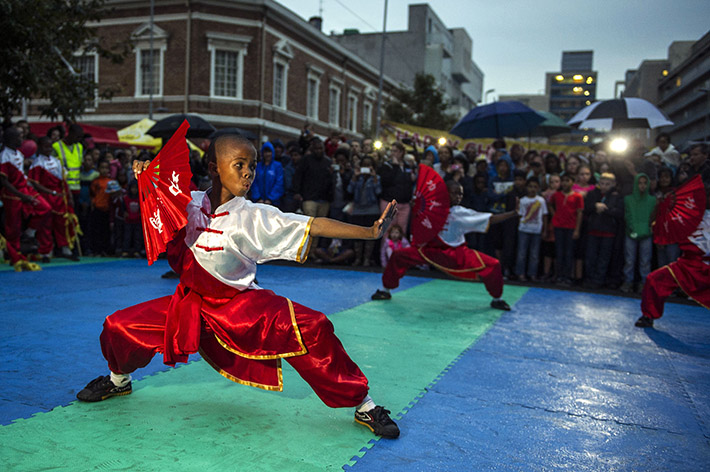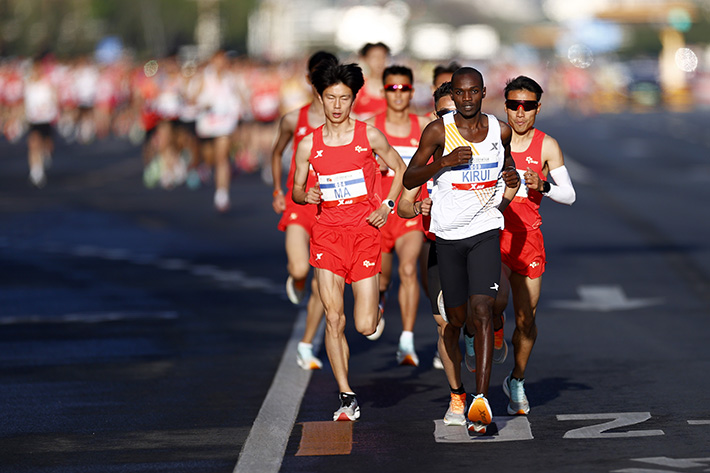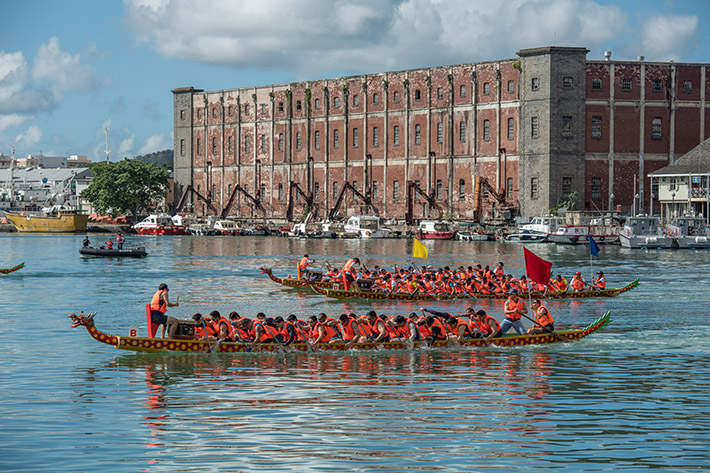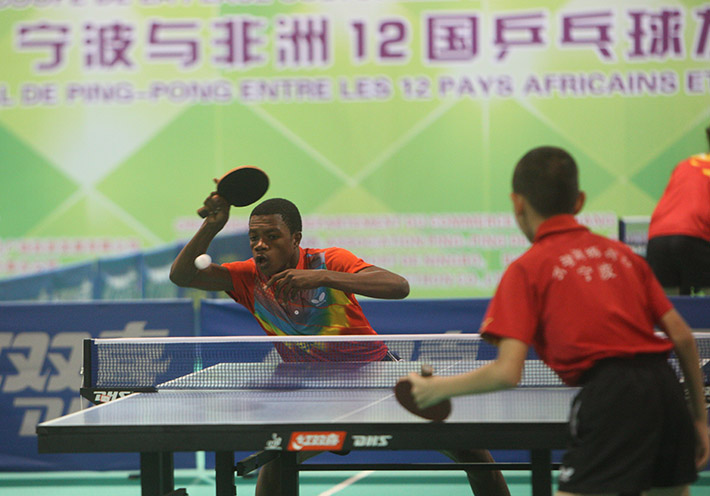|
||||||||||
| Home Nation World Business Opinion Lifestyle ChinAfrica Multimedia Columnists Documents Special Reports |
|
||||||||||
| Home Nation World Business Opinion Lifestyle ChinAfrica Multimedia Columnists Documents Special Reports |
| Current Cover Story |
| Sports Foster Friendship |
| China-Africa sports diplomacy has achieved fruitful results |
| By Zhou Qingjie | VOL. 15 November 2023 ·2023-11-02 |

South African enthusiasts perform wushu in Johannesburg, South Africa, on 21 February 2015 (VCG)
The widely known ping pong diplomacy led to the establishment of Sino-US diplomatic relations after a two-decade breakdown, and became a major historical event that promoted the development of relations between countries and even changed the international situation.
However, what is little known is that the ping pong diplomacy was actually used much earlier when China established diplomatic relations with African countries in the 1950s and 1960s. In fact, in addition to ping pong diplomacy, sports diplomacy between China and African countries has always played an important role in bringing the two sides closer.
Sports diplomacy as public diplomacy
China-Africa sports diplomacy began in the 1950s. In 1957, the Chinese women’s table tennis team attracted worldwide attention after winning the third place at the 24th World Table Tennis Championships in Sweden. After the victory, the team was invited to visit Egypt, which had established diplomatic relations with China less than a year before, marking the beginning of China-Africa sports diplomacy.
In order to enhance China-Africa relations and deepen China-Africa friendship, from 1963 to 1965, Premier Zhou Enlai led Chinese delegations on three goodwill visits to 10 African countries including Egypt, Algeria and Morocco. During his visit to Ghana, Premier Zhou played table tennis with Ghanaian President Kwame Nkrumah, and Vice Premier Chen Yi, who was also visiting, voluntarily served as the referee. The scene was warm and touching. Such high-level sports diplomacy events involving top leaders have become legends, and are remembered by later generations.
Late South African President Nelson Mandela once said that sports have the power to change the world. This statement reveals the unique value of sports. With his personal charm and global influence, Mandela made great contributions to South Africa’s success in hosting the 2010 World Cup. It attracted the world’s attention to South Africa and the African continent, and greatly inspired people in Africa to unite and commit to national and continental development.
Late Cameroonian President Ahmadou Ahidjo was a huge football fan. He vigorously promoted football and made outstanding contributions to Cameroon’s success in world football games. As the greatest football player in African history, Liberian President George Weah was the first African to win the FIFA World Player of the Year. After retiring, he was successfully elected as president and devoted himself to the development of the country with his huge global influence.
There are many leaders of African countries who show varying degrees of love for football. When celebrations are held after the stadiums built with Chinese aid in these countries are completed, friendly football matches with China are the most popular repertoire. Weah often attends these events and watches football matches to thank China for its contribution to the development of bilateral relations.
Chinese President Xi Jinping attaches great importance to China-Africa sports diplomacy. During his state visit to Senegal on 22 July 2018, President Xi and his Senegalese counterpart Macky Sall attended the handover ceremony of the National Wrestling Arena built with Chinese aid, and watched Senegalese traditional competitive wrestling performances. The wrestling arena is China’s largest aid project in Senegal and the first modern wrestling arena in Africa.
The arena is a vivid reflection of the profound friendship between the Chinese and the Senegalese, President Xi said. Hailing Senegal as a country of culture, President Xi said China is ready to work with Senegal in committing itself to preserving and carrying forward traditional cultures so as to promote cultural exchanges and cooperation between the two sides.
Subsequently, on the eve of his state visit to Rwanda on 22 July 2018, President Xi published a signed article titled China and Rwanda: A Friendship Higher Than Mountains in the mainstream Rwandan newspaper The New Times. In the article, President Xi praised the friendship between China and Rwanda and specifically mentioned, “We are glad to see that the Amahoro National Stadium built by China has hosted many spectacular sports games and become a popular recreation and entertainment venue for the Rwandan people.”

At the 2023 Beijing Half Marathon, Kenya’s Brian Kwemoi Kirui (second right) sets a new men’s record with a 59:37 finish on 16 April (CNS)
Institutionalised cooperation
Among the many documents signed between China and different African countries and the African Union, most of them have statements about strengthening bilateral and multilateral “cooperation in the field of sports.” Such provisions are rare in the history of international relations. In the declarations, statements, plans, mechanisms and other texts jointly signed by the two sides, the frequency of the word “sports” has increased significantly, and the amount of related text expressions has been going up. It shows the importance of sports in the development of China-Africa relations.
China’s second Africa policy paper released in 2015 said that according to the principle of focusing on key areas and doing things within its capability, China will strengthen exchanges and result-oriented sports cooperation with African countries and continue to provide assistance to support the development of sports in African countries.
The Agenda 2063, Africa’s development blueprint, states that Africa will emerge as a strong, resilient and influential global player and partner, with a bigger role in world affairs. The first 10-year plan (2014-2023) of the agenda makes sports a priority: “Focus should include the following areas: culture, arts and sport.” The agenda also unprecedentedly elevates sports to a level that is closely related to the development of the entire African continent in the next half a century.
The signing of the cooperation documents between China and African countries and between China and African organisations has a crucial impact on institutionalising sports dialogue at all levels, deepening bilateral and multilateral sports exchanges and cooperation, and expanding China-Africa people-to-people and cultural exchanges.
In 2017, the High-Level People-to-People Exchange Mechanism Between China and South Africa was established. It was the first high-level people-to-people exchange mechanism established between China and an African country, which includes specific content to strengthen sports cooperation between the two sides. Among the outcomes of the Eighth Ministerial Conference of the Forum on China-Africa Cooperation in 2021 in Dakar, Senegal, statements on China-Africa sports exchanges and cooperation set high goals, drawing a grand blueprint for China-Africa sports exchanges and cooperation. China-Africa sports diplomacy has accumulated rich pioneering practical experience in the process of institutional development.

A Dragon Boat Race organised by the China Cultural Centre in Mauritius in 2018 (CHINA CULTURAL CENTRE IN MAURITIUS)
Future prospects
In recent years, the cooperation between China and Africa under the Belt and Road Initiative has reaped fruitful results. The comprehensive national strength of some African countries has gradually improved, and their sports awareness has gradually increased. They have raised their participation in regional sports, and become “the key to the development of African sports.”
Under the principle of sincerity, real results, amity and good faith for China’s Africa policy, China has helped African countries and African people to independently explore their own sports development paths. This has not only provided new impetus for strengthening China-Africa sports exchanges and cooperation, but has also opened up broad prospects for the development of sports in Africa.
On the eve of the Beijing 2022 Olympic Winter Games and Beijing 2022 Paralympic Winter Games, in the face of noises from some countries with ulterior motives threatening to adopt “diplomatic boycott” in order to disrupt the games, African countries firmly joined China in upholding justice and carrying forward the Olympic spirit of peace, friendship and unity, demonstrating the strength of China-Africa friendship. African countries’ support to China in hosting the games is an example of the practice of the concept of a China-Africa community with a shared future.

A player from Africa competes with a Chinese player at the China (Ningbo) and 12 African Countries Ping Pong Friendly Matches held on 9 August 2014 in Ningbo City, Zhejiang Province, China (CNS)
After more than 60 years of sports diplomacy, China-Africa sports diplomacy has formed an all-round, multi-channel, and wide-ranging pattern and continues to deepen. The principles of equality, inclusiveness and sharing upheld by China-Africa sports diplomacy will help to provide new ideas, concepts and plans for the reform and development of the global sports governance system, thereby promoting the development of the global sports governance system in a more balanced, fairer and more reasonable direction. African sports’ demands for equitable development also drive China to play a leading and driving role and assume the responsibility of a responsible sports power.
Chinese wushu is included as an official event in the Dakar 2026 Youth Olympic Games. It is the first time that wushu will be officially included in Olympic competition. It will be a landmark event and a great opportunity for the exchange of civilisations between China and Africa.
The author is Professor and Director, Sports Exchange and Research Centre, China Foreign Affairs University.
| About Us | Contact Us | Advertise with Us | Subscribe |
| Copyright Beijing Review All rights reserved 京ICP备08005356号-5 京公网安备110102005860号 |